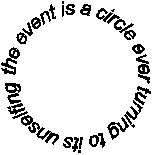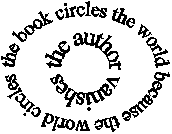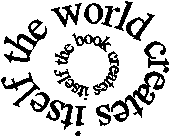2009 :: Issue 4/Spring :: Poem Fragments
I. (Trans)Forming
A. Mazes
+ one is born into a maze + dying is the only way out said the spider + in between + life winds and unwinds its winding paths + the maze is within + in the convolutions and revolutions of the mind + in the impressions and expressions of the body + the maze is without + in the sinuosities of space + in the tortuousities of time + connecting the maze within to the maze without + the tangled maze of sense and sensation + some say the inner and outer maze are one + the only way to map the maze is to lose one’s way in it + the secret of the labyrinth + the maze is a circle + there is nothing more labyrinthine than a circle + it always returns you to the same place + now-here + one cannot get lost nowhere + the labyrinth is not a place + it is an adventure + a perpetual arrival + a perpetual departure + what is life but a vertiginous succession of labyrinths + the labyrinth of each (sur)passing moment losing itself in the next one + the lost mapmaker goes in circles + ever returning to the never-the-same + since the path is a circle + one cannot say he is lost + but since the circle always returns elsewhere + one cannot say he is not lost + both here and there + and neither here nor there + where is the mapmaker +
Bibliography
Anonymous. Sutra on Knowing the Better Way to Live Alone. + Berkeley, George. A Treatise Concerning the Principles of Human Knowledge. + Borges, Jorge Luis. Labyrinths. + Calasso, Roberto. The Marriage of Cadmus and Harmony. + Calvino, Italo. If on a Winter’s Night a Traveler. + Deleuze, Gilles. Difference and Repetition. + Hawking, Stephen. The Universe in a Nutshell. + Lowry, Malcolm. Under the Volcano. + Nietzsche, Friedrich. The Will to Power.
B. Circles

The event has no identity—as soon as it comes to be, it’s already becoming something else.
Beginningless, endless, a circulation of circles, reality is a revolution of events.
In the circle of wisdom necessity becomes freedom and freedom becomes necessity because there is no longer necessity, no longer freedom—there is only circulation.
It has become impossible to write books that begin and end. Now one can only write beginningless endless books that revolve around the beginningless endless moment, where the punctum of the infinitesimal and the revolution of the infinite converge.
Everything returns to the unbeginning.
As the unwritten turns to writing, writing returns to the unwritable.
Because knowing circles ignorance, and ignorance knowing, to write is to circle between knowing and not-knowing.
In time, the circle and the line are one.
Humans—homo memorialis—are the only animals that must cannibalize themselves to survive—we feed on our memories to sustain our self-recognition: I’m still myself, aren’t I?
What will become of me, if you become someone else?
The world is constantly reminding us that we don’t know, the body that we don’t need to know. Contradicting the world and the body, the mind suffers agonies.
To act is to forget oneself.
The human propensity to confuse the memorable with the true.
Is the one who remembers while I sleep the same as the one who forgets when I’m awake? In the tangle of memories and forgettings I seek myself, and I find something—though there’s no one there.


Bibliography
Deleuze, Gilles. The Logic of Sense.
Heraclitus. Fragments.
Jabès, Edmond. The Book of Questions.
James, William. A Pluralistic Universe.
Lao Tzu. Tao Te Ching.
Marvell, Andrew. The Complete Poems.
Nietzsche, Friedrich. Untimely Meditations.
Plato. The Apology.
Schacter, Daniel. The Seven Sins of Memory.
Smith, Huston. The World’s Religions.
Spinoza, Baruch. Ethics.
Stevens, Wallace. Ideas of Order.
C. Folds
I pick up a fragment. I pick up another fragment. This is called art.
destroyed or created
ever is
nothing
physics in
as art in
A man of many folds.
?other the mysteries
of heap that and
self my mysteries of heap
this call I do
why
History in a bombshell—Everyone making his own little pile and guarding it jealously from everybody else.
Bibliography
Anonymous. The Wisdom of the Heart.
Carroll, Lewis. Dhammapada.
Deleuze, Gilles. Through the Looking Glass.
Einstein, Albert. The Fold: Leibniz and the Baroque.
Gonick, Larry. “On the Electrodynamics of Moving Bodies.”
Hobsbawm, Eric. The Cartoon History of the Universe.
Leibniz, Gottfried. The Age of Extremes.
Miller, Henry. Monadology.